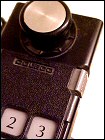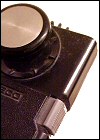 The video game wars officially enter a new generation of hardware as Connecticut-based toymaker Coleco unveils the Colecovision home video game system. Packaged with an almost-but-not-quite-arcade-accurate port of the hit game Donkey Kong, and pushed by an advertising campaign focusing on the message of “bringing the arcade experience home,” Colecovision’s best opening gambit may be an “Expansion Module” allowing the use of Atari VCS games on the console, making it possible for Atari owners to step up without having to rebuild their game libraries from scratch.
The video game wars officially enter a new generation of hardware as Connecticut-based toymaker Coleco unveils the Colecovision home video game system. Packaged with an almost-but-not-quite-arcade-accurate port of the hit game Donkey Kong, and pushed by an advertising campaign focusing on the message of “bringing the arcade experience home,” Colecovision’s best opening gambit may be an “Expansion Module” allowing the use of Atari VCS games on the console, making it possible for Atari owners to step up without having to rebuild their game libraries from scratch. ![]()

 Coleco Industries formally announces the complete discontinuation of its Adam computer and the Colecovision home video game console, after revealing a $55,000,000 loss for 1984, a loss incurred largely by the market failure of Adam; only the hugely popular Cabbage Patch Kids dolls, another Coleco product, keep the company from losing any more money. Coleco’s remaining game and computer stock is sold to closeout retail chain Odd Lot, and the video game market crash claims another victim.
Coleco Industries formally announces the complete discontinuation of its Adam computer and the Colecovision home video game console, after revealing a $55,000,000 loss for 1984, a loss incurred largely by the market failure of Adam; only the hugely popular Cabbage Patch Kids dolls, another Coleco product, keep the company from losing any more money. Coleco’s remaining game and computer stock is sold to closeout retail chain Odd Lot, and the video game market crash claims another victim. Having weathered the storm of the 1983 video game industry crash longer than most, Coleco Industries, maker of the early ’80s Colecovision video game system, files for Chapter 11 bankruptcy protection. At the time of the filing, Coleco is America’s sixth largest toy company, but the video game industry isn’t its downfall. Overproduction of the company’s Cabbage Patch Kids toys has proven to be fatal, with two straight years of annual losses exceeding $100,000,000. The remains of Coleco are eventually bought up by rival toymaker Hasbro.
Having weathered the storm of the 1983 video game industry crash longer than most, Coleco Industries, maker of the early ’80s Colecovision video game system, files for Chapter 11 bankruptcy protection. At the time of the filing, Coleco is America’s sixth largest toy company, but the video game industry isn’t its downfall. Overproduction of the company’s Cabbage Patch Kids toys has proven to be fatal, with two straight years of annual losses exceeding $100,000,000. The remains of Coleco are eventually bought up by rival toymaker Hasbro.